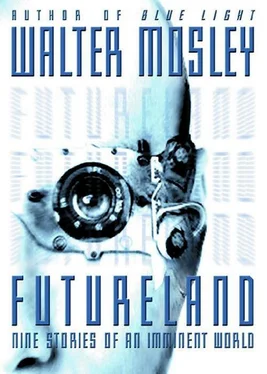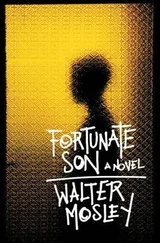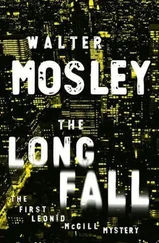“And what happens to me, Dr. Bel-Nan? What happens when you rip out the center of my brain?”
The yellow-eyed woman looked down when she heard this question.
“You were dead when they brought you to me,” Bel-Nan said. “Confined to a gravity chair, having to undergo shock treatments eighteen hours a day. Hardly able to speak more than a sentence before you went into spasm. There was no cure. There was no hope but me. I gave you life. And now I’m asking for repayment. Your few months of grace for the life of my daughter.”
“What if I don’t want to give up my life just yet?”
“We cannot wait. As time passes, Tracie’s personality will become a part of you. We must move her while she is still distinct. And anyway, you want her to survive. You love her as much as I do.”
Leon thought about these last words. He did love the girl. He wanted her to be alive and happy. He wondered if there was a compromise that could be reached.
But while he thought a hand grabbed his shoulder. He felt a familiar tingling at his elbow and fell again.
“Wake up, Leon,” a girl’s voice said.
It was Tracie. But she had aged at least six months, taller now and wearing the same blue jeans that her mother had worn. Her face was just that much longer, and the happiness in her eyes was leavened with the awareness of Leon’s fear.
“Where am I?” he asked.
“I don’t know,” she said. “I can’t see what you see right away.”
“Are they operating?”
“No.”
“How can you be sure?”
“I heard something,” she said. “They arrested my daddy for taking you away.”
“When?”
“I don’t know. I don’t hear things right away, either. And you’ve been sleeping so it takes even longer.”
“Daddy?”
Leon opened his eyes to see Fera standing above his bed. He was in a hospital. The ocean roared outside the window.
“Honey?”
“Yes, Daddy,” the congresswoman from the Bronx replied. “How are you?”
“What happened?”
“Pell got your letter and he got the international corporate corps to free you.”
“But how did you find me?”
“We put a tracer on you, Daddy. Don’t get mad. It’s just that when you first got out of the hospital you were so foggy. I worried that you might forget to carry your chip, so Pell had your dentist do it at your last checkup. And it’s lucky he did.”
“I’m not mad. Nothing belongs to me anyway.”
“What do you mean?”
“Not my body or my mind, not my history or even what I know. But it ain’t bad. Naw. It ain’t bad at all. ’Cause I’m still feelin’ and thinkin’ somethin’.”
“They want you to go to a government laboratory for some tests, Daddy,” Fera said. “It’s in a nice place.”
“What happened to Bel-Nan?”
“He was sent back to the polar prison. MacroCode paid off on his policy. They took the whole installation back for study and critique.”
“Are they going to start with transplantations?”
“I don’t know, Daddy. I don’t know.”
That night Leon went outside to walk on the beach. He didn’t know what ocean it was or what sky. But the air was warm and the waves crashed. He walked down the shore with a small child at his side. They talked and laughed, but only he left footprints in the sand.
Frendon Blythe was escorted into courtroom Prime Nine by two guards, one made of flesh and the other of metal, plastic, four leather straps, and about a gram of cellular gray matter. The human guard was five feet three inches tall, wearing light blue trousers with dark blue stripes down the outer seam of each pant leg. He wore a blue jacket, the same color as the stripes, and a black cap with a golden disk above the brim. Thick curly hair twisted out from the sides of the cap and a dark gray shadow covered his chin and upper lip. Other than this threat of facial hair, Otis Brill, as his name tag plainly read, had skin as pale as a blind newt’s eye.
Otis had been his only human contact for the six days that Frendon had been the prisoner of Sacramento’s newly instituted, and almost fully automated, Sac’m Justice System. Otis Brill was the only full-time personnel at Sac’m. And he was there only as a pair of eyes to see firsthand that the system was working properly.
The other guard, an automated wetware chair called Restraint Mobile Device 27, used straps to hold Frendon’s ankles and wrists fast to the legs and arms. RMD 27 floated silently down the wide hall of justice on a thousand tiny jets of air. The only sound was the squeaking of Otis Brill’s rubber shoes on the shiny Glassone floor.
The gray metal doors to courtroom Prime Nine slid open and the trio entered. Lights from the high ceiling winked on. Frendon looked around quickly but there was only one object in the music-hall-size room: a dark gray console maybe five meters high and two wide. In the center of the console was a light gray screen a meter square.
RMD 27 positioned itself before the screen and uttered something in the high frequency language of machines. The screen lit up and a cowled image appeared. The image was photo-animae and therefore seemed real. Frendon could not make out the face under the shadows of the dark cowl. He knew that the image was manufactured, that there was no face, but still he found himself craning his neck forward to glimpse the nose or eye of his judge, jury, and executioner.
“Frendon Blythe?” a musical tenor voice asked.
There was a flutter at the corner of the high ceiling and Frendon looked up to see a pigeon swoop down from a line of small windows thirty feet above.
“Goddamn birds,” Otis cursed. “They get in here and then stay up at the windahs until they kick. Stupid birds don’t know the stupid windahs don’t open.”
“Frendon Blythe?” the voice repeated. In the tone there was the slightest hint of command.
“What?” Frendon replied.
“Are you Frendon Ibrahim Blythe, U-CA-M-329-776-ab-4422?”
Frendon rubbed his fingers together.
“Answer,” Otis Brill said.
“It is required that you answer as to your identity,” the cowled console image said.
“What if I lied?” Frendon asked.
“We would know.”
“What if I thought I was somebody but really I wasn’t?”
“You have been physiologically examined by RMD 27. There is no evidence of brain trauma or aberrant neuronal connection that would imply amnesia, senility, or concussion.”
“Why am I strapped to this chair here?”
“Are you Frendon Ibrahim Blythe?” the cowled figure asked again.
“Will you answer my questions if I answer yours?”
After a second and a half delay the machine said, “Within reason.”
“Okay, then, yeah, I’m Frendon Blythe.”
“Do you know why you’re here?”
“Why you got me strapped to this chair?”
“You are considered dangerous. The restraint is to protect the property of the state and to guard the physical well-being of Officer Brill.”
“Don’t you got a neural-cam attached to my brain?”
“Yes.”
“Then the chair here could stop me before I did anything violent or illegal.”
After a three-second delay there came a high-pitched burst. The straps eased their grips and were retracted into the plastic arms and legs of the wetware device.
Frendon stood up for the first time in hours. In the past six days he had only been released long enough to use the toilet. He was still connected to the chair by a long plastic tube that was attached at the base of his skull.
He was a tall man, and slender. His skin was the red-brown color of a rotting strawberry. His eyes were murky instead of brown and his wiry hair contained every hue from black to almost-orange.
Читать дальше












